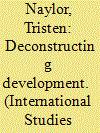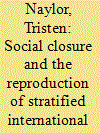| Srl | Item |
| 1 |
ID:
103308


|
|
|
|
|
| Publication |
2011.
|
| Summary/Abstract |
This study examines how power operates within international development discourse and investigates its effects on development organizations and on individuals-donors and recipients of aid alike. It analyzes the narratives pertaining to Afghanistan that are (re)produced by five different types of development actors: a donor state, a recipient state, an international financial institution, an international organization, and a non-governmental organization. I argue that the operation of multiple, interrelated types of power has both ideational and material effects which manifest in development policies, programs, and projects. I demonstrate how these types of power operate discursively through a Politics of Pity which (re)creates and perpetuates hierarchical, coconstituted relationships between and among these actors, and which (re)constitutes the identities and abilities of actors.
|
|
|
|
|
|
|
|
|
|
|
|
|
|
|
|
| 2 |
ID:
184045


|
|
|
|
|
| Summary/Abstract |
This article investigates how the means by which actors compete for position in the management of international society stratifies international order. Advancing scholarship on hierarchies, it applies a theory of social closure to examine two status groups, The Family of Civilised Nations and the G20, arguing that stratification is reproduced by a dynamic interplay of top-down collectivist exclusion on the part of superiorly positioned actors and bottom-up mimicry performed by those inferiorly positioned. As such, the same means of closure which used the Standard of Civilisation to exclude outsiders from the Family of Civilised Nations in the past stratifies non-state actors today, particularly international non-governmental organisations (INGOs) seeking to play a role in-the G20. This article offers amendments to closure theory in International Relations (IR), demonstrating its utility for analysing contemporary international politics, engaging in trans-historical analysis, and in incorporating non-state actors into enquiry.
|
|
|
|
|
|
|
|
|
|
|
|
|
|
|
|